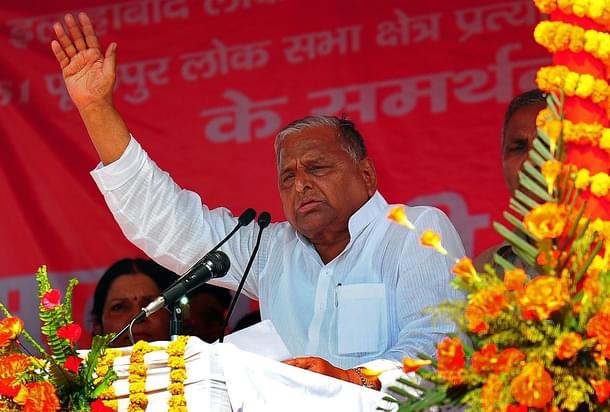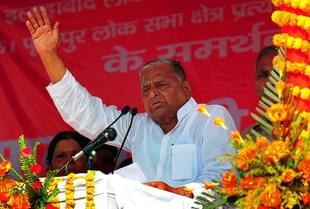Politics
For Better Governance, UP Needs To Shun Personality Cults And Embrace A Party
Vikas Saraswat
Nov 02, 2016, 05:54 PM | Updated 05:54 PM IST
Save & read from anywhere!
Bookmark stories for easy access on any device or the Swarajya app.


When it comes to Uttar Pradesh (UP), the Indian state with the largest population, all social indices and economic parameters tell a harrowing tale. As per the Planning Commission data for the financial year 2013-14, among all recorded figures, the state’s rate of growth of gross domestic product (GDP) was the second-worst at 5.14 per cent, with only Andaman and Nicobar trailing it.
Despite being an agricultural state primarily, the data said, 22 states and Union Territories fared better than it. And as far as industrial growth was concerned, only Manipur, Jammu and Kashmir, Assam, West Bengal and Delhi fared worse.
Furthermore, data released by the Reserve Bank of India in September 2013 ranks the state in the twentieth place on the poverty index with 29.43 per cent of its population (based on the Tendulkar committee guidelines) living below poverty line.
A study conducted by the Public Affairs Centre said UP languishes at rankings between twelfth and fifteenth among the 17 large states, on various parameters like human development, law and order and basic infrastructure. Its infant mortality rate is the second-worst in India, and its spending on health and education, even lesser than Bihar.
And yet, with elections approaching early next year, the chief concerns of the two major players in UP politics appear to be: the family feud in the case of Samajwadi Party (SP) and phoney notions of social justice for Bahujan Samaj Party (BSP).
Oblivious to the growth and improvement taking place in various social spheres in the neighbouring Rajasthan, Madhya Pradesh and Uttarakhand, the two parties, which have held power in turns for the last 15 years, have no vision to offer for the future, and have resorted to the only electoral tool in their kitty – caste mobilisation.
While there are a number of reasons for UP's continuous decay and decline, a fair share of the blame is to be apportioned to its politics. There can be no denying that politics centred around individuals and families and the pursuance of ugly casteism have proved to be a curse for UP. It comes as no surprise that the rise of two caste-based parties around personality cults has coincided with the steep fall in the GDP growth rate; during the first half of 1980s, the state had consistently recorded the highest GDP growth rate, hovering around 9 per cent.
Both the parties have not only harboured leaders of similar traits – obnoxious character marred by nepotism and corruption, but have continued to entertain them despite malpractices committed by them. Yadav Singh and Arun Mishra are just two examples. Both of them rose to the highest positions of power without having any qualifications. Both were persisted with by both the SP and BSP governments even after grave corruption charges were levelled against them.
The brazenness of corruption reflected in not just the statements of Shivpal Yadav, who on camera advised babus to take “only small bribes” but also in UP government’s shameless re-induction of ministers dismissed on charges of corruption. While SP continues to be embroiled in various corruption charges, former Chief Minister Mayawati has faced allegations of auctioning party tickets to the highest bidders by her own party-persons, some of whom even left the BSP.
But more than the economic woes and corruption, it is the abysmal law and order condition which has made UP a living hell. No data can capture the real crime statistics as all mechanisms are either severely dysfunctional or compromised. Goondaism under the two parties thrives, as their basic nature is fundamentally similar.
Like in all personality-centred parties, there is an absence of ideology-driven cadre, with the office bearers of both SP and BSP relying on strongmen to derive their strength from, and muscle power from the castes they represent.
In addition, with castes forming the core constituency of the two parties, they virtually gain a licence to loot the exchequer and intimidate others. Plum postings, government jobs and jobs at police stations have all been based on caste and “earnings” for the leaders as the criterion. Land grabbing and extortion have been the order of the day.
For governance to be put back on track in UP, the only way is to salvage its politics from individuals and restore it to a party. These cult-based parties, which work solely around caste mobilisation and minority appeasement, have not only stalled development and fostered goondaism and corruption but also undermined democracy. The very idea of democracy is to save politics from the tyranny of individuals and dynasties. And so it is an ironic travesty when electoral politics in a democracy becomes a vehicle for perpetuation of individual cults and dynasties.
India’s most populous state has a long way to go before it can again catch up with the growth in physical and social infrastructure and economic development experienced in the rest of India. But for it to even start moving in that direction, it needs a party which isn't given to vested interests, is ideologically driven and committed to governance.
And to that end, there really isn’t more than one choice.




